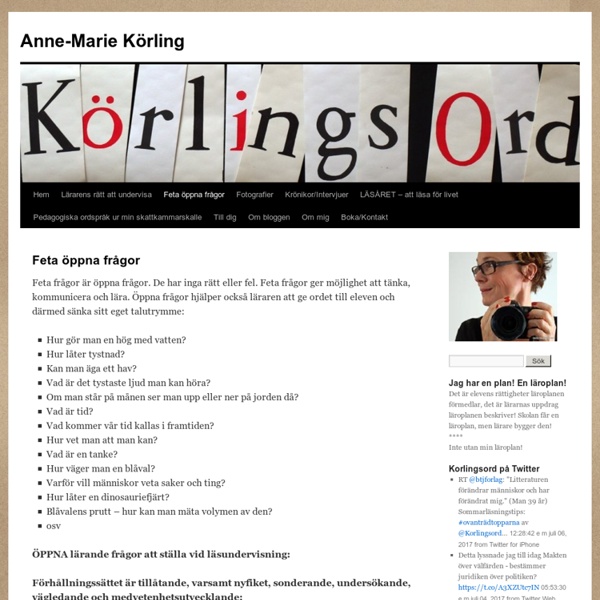



http://korlingsord.se/feta-oppna-fragor
Related: tuvaliten • skolutvecklingTeaching kids to design questions – one piece at a time Logan loves to touch everything. He asks lots of questions and I love it… even when I can’t answer the questions. Why is the sky blue? How does a dog breathe? 8 ways teachers can talk less and get kids talking more If you do fewer teacher-directed activities, that means the kids will naturally do more talking, doesn’t it? Not necessarily. I have often found myself talking almost constantly during group work and student-directed projects because I’m trying to push kids’ thinking, provide feedback, and help them stay on task. Even when the learning has been turned over to the students, it’s still tempting to spend too much time giving directions, repeating important information, and telling students how they did instead of asking them to reflect on their work. Here are 8 ways teachers can talk less and get students talking more:
5 Powerful Questions Teachers Can Ask Students My first year teaching a literacy coach came to observe my classroom. After the students left, she commented on how I asked the whole class a question, would wait just a few seconds, and then answer it myself. "It's cute," she added. Um, I don't think she thought it was so cute. I think she was treading lightly on the ever-so shaky ego of a brand-new teacher while still giving me some very necessary feedback. So that day, I learned about wait/think time. Superhero Craft - Superhero Handprints - The Best Ideas for Kids If you have a superhero fan in your house – then this easy superhero craft will be a big hit! We were inspired to make these from different superhero painted handprints we have seen. We turned these handprints into cards so you can use them for Valentine’s Day, a birthday card or Mother’s Day / Father’s Day. And the best part is they are really easy to make!
The Importance of Asking Questions to Promote Higher-Order Competencies Irving Sigel devoted his life to the importance of asking questions. He believed, correctly, that the brain responds to questions in ways that we now describe as social, emotional, and cognitive development. Questions create the challenges that make us learn. The essence of Irv's perspective is that the way we ask questions fosters students' alternative and more complex representations of stories, events, and circumstances, and their ability to process the world in a wider range of ways, to create varying degrees of distance between themselves and the basis events in front of them, is a distinct advantage to learning. However, Irv found that schools often do not ask the range of questions children need to grow to their potential. In this column and the next, using the story of Goldilocks and The Three Bears, we can learn from Irv about how to improve our question asking so that students learn more from text and from the world around them.